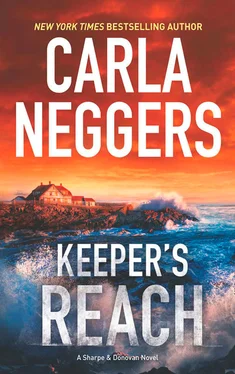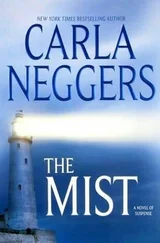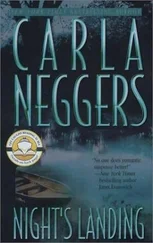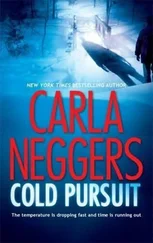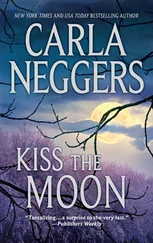“Thank you,” he said, lowering his arm from her shoulders.
Naomi stood back, noticing he had on a Barbour jacket, too. From the looks of him, he had been out in the elements awhile. The jacket probably had helped save him from exposure. “Shall I call an ambulance?” she asked him.
“No, no. I’m all right. I took a nasty tumble.”
“When?”
He blinked at her. “When?” he repeated.
“It’s Thursday morning,” she said. “Do you remember when you fell? Did you lose consciousness?”
“I was out overnight.” He swallowed, licked his lips. “Thank you for your help.”
His tone was formal, almost embarrassed. He started up the hill, his gait practiced if not steady. Naomi spotted him from behind but had no idea what she would do if he fell back against her. They would probably both end up plunging into the stream.
He didn’t move fast, but he did make it to the top of the hill and the strip of grass behind the dovecote. He placed a hand at his right temple, his face ashen.
“Headache?” Naomi asked.
“Blistering.”
Only then did she see the blood caked on his neck. “You’re hurt,” she said.
“I must have hit my head on a rock or a tree root when I fell.”
“You’ve been bleeding. Do you want me to take a look?”
“I tore a chunk out of the back of my neck. Blood dribbled down my front. I landed facedown when I fell.” He grimaced, sinking against the dovecote. “Sorry to be such trouble.”
“You’re no trouble at all. Is there someone I can call?”
He stood straight, looking steadier, then motioned toward the front of the dovecote. He started walking, stiffly and unsteadily. Naomi fell in next to him, but she couldn’t tell how badly he was hurt. He could be acting out of stubbornness, disorientation, pain or, for all she knew, fear. How did she know his fall was an accident?
She also was guessing—was almost certain—the injured man was Martin Hambly, Oliver York’s longtime personal assistant.
He stumbled once but shook off her help and instead balanced himself with a hand on the exterior of the dovecote. When he reached the entrance, he pushed open the door and collapsed onto a wood chair against the wall by the worktable. He looked as if he was about to pass out, or maybe vomit—or both. Although obviously cold, he didn’t seem to be suffering from hypothermia. At the very least he had to be dehydrated if he had been out all night.
Naomi grabbed a bottle of water off the worktable, opened it and handed it to him.
He took a long drink and seemed to rally. “Thank you,” he said. “You’re American?”
“Mmm. Out for a walk.” She tried to get a look at his head injury, but it was difficult to see with his coat collar. “I can hail someone.”
“I’ll do it.”
He pointed at a cell phone on the worktable. She handed it to him, and he held it in his palm, trembling. He took in an audible breath, then managed to hit a few numbers.
“It’s Hambly,” he said when someone picked up on the other end. “I’m at the dovecote. I took a fall and need assistance. Not an ambulance. Thank you.” He slipped the phone into his jacket pocket. “I feel better already getting off that wet ground.”
“What happened?”
He seemed confused. “What do you mean, what happened?”
“How did you fall?”
“There are a thousand ways to fall in these conditions. I appreciate your coming to my aid, but you mustn’t let me keep you from your walk. I’m fine, honestly.”
“Head injuries can be dangerous, Mr. Hambly. If you lost consciousness—”
“I’ll check with my doctor. Thank you again.”
Naomi had no more desire to deal with the authorities than he did. Once she gave them her name, her situation could unravel fast from there. She wouldn’t even have to mention the FBI agent who had joined her for breakfast a twenty-minute walk away. Then if Kavanagh found out what she had been up to that morning...
An elderly farmworker arrived, identifying himself merely as Johnny as he took over Martin Hambly’s care.
Relieved and reassured, Naomi left them and headed to the track, turning back toward the village. She had resisted glancing at the locked door inside the dovecote, but she didn’t want to make too much of it. Oliver York was a wealthy man. If he was in fact an art thief, he had plenty of places to conceal his misdeeds.
* * *
Naomi wasted no time on enjoying the bucolic scenery on her walk back to the pub. She ducked through the courtyard—not a chicken in sight now—into her room. Her wet, muddy pants and socks were definitely not appropriate for Heathrow. She peeled them off and dumped the pants and socks in the trash. She didn’t have time to rinse them off and find a plastic bag to stuff them in for her flight. She cleaned the mud splatters off her jacket and boots as best she could. She had planned to wear her jacket on the plane but decided to pack it instead. She didn’t want to risk anything interfering with her getting home to Nashville tonight.
She wished she had time for another shower but washed up at the sink, making sure there wasn’t so much as a speck of mud on her. She didn’t know if the dovecote counted as being on a farm—a definite red flag at customs—but better safe than having to explain.
Did Hambly really not remember what had happened to him? Should she have rung the police?
Her reaction had been normal, nothing any other tourist out for a walk wouldn’t have done. Probably countless people had a peek at the dovecote. Nothing provocative in doing that, and, in any case, the injured Hambly might think she’d ventured off the public track because she’d heard him.
Her new clothes weren’t as comfortable as the ones heaped in the trash, but they would do. She zipped up her suitcase, scanned the room for anything she might have missed and headed out, shutting the door behind her.
She debated mentioning her encounter at the York farm at checkout but only for a fleeting moment. It was madness, really, to say a word about it.
She was fast coming to regret her detour to the Cotswolds.
When she emerged from the pub and saw Reed Cooper leaning against the hood of a sleek, dove-gray car, there was no question anymore. Kavanagh, Hambly and now Cooper?
She should have stayed in London.
“Hello, Naomi,” Reed said, his middle Tennessee accent not as pronounced as hers. “I’m your ride to Heathrow.”
“You canceled my car?”
“I didn’t think you’d mind.”
That was Reed. “You’re presumptuous,” she said.
He stood straight, wearing an expensive suit with no overcoat despite the cool temperature. “Hop in or you’ll miss your flight.”
He went around to the passenger side of the car and opened the door. Naomi eased past him. He took her suitcase, and she slid into the car. What other choice did she have? The bus? Hitchhiking?
Reed shoved the suitcase into the backseat. She watched him circle around to the driver’s side. She had bonded with him in Afghanistan because they were both Tennesseans and Vanderbilt graduates. He was from a prominent old-money Nashville family who had expected him to go into business, and she was from a small town east of Nashville, the older daughter of an army reservist killed in Iraq her freshman year in college and a seamstress who had loved and hated him and still missed him terribly. Reed was seven years older than Naomi—he had graduated by the time she stepped onto the beautiful Vanderbilt campus, dreaming of a life very different from the one she was leading.
She wondered what Reed’s hopes and dreams had been as a college freshman, but she had never asked. He had risen to captain in the army and now was launching his own small team of private operators to provide security for people like her volunteer medical professionals.
Читать дальше
